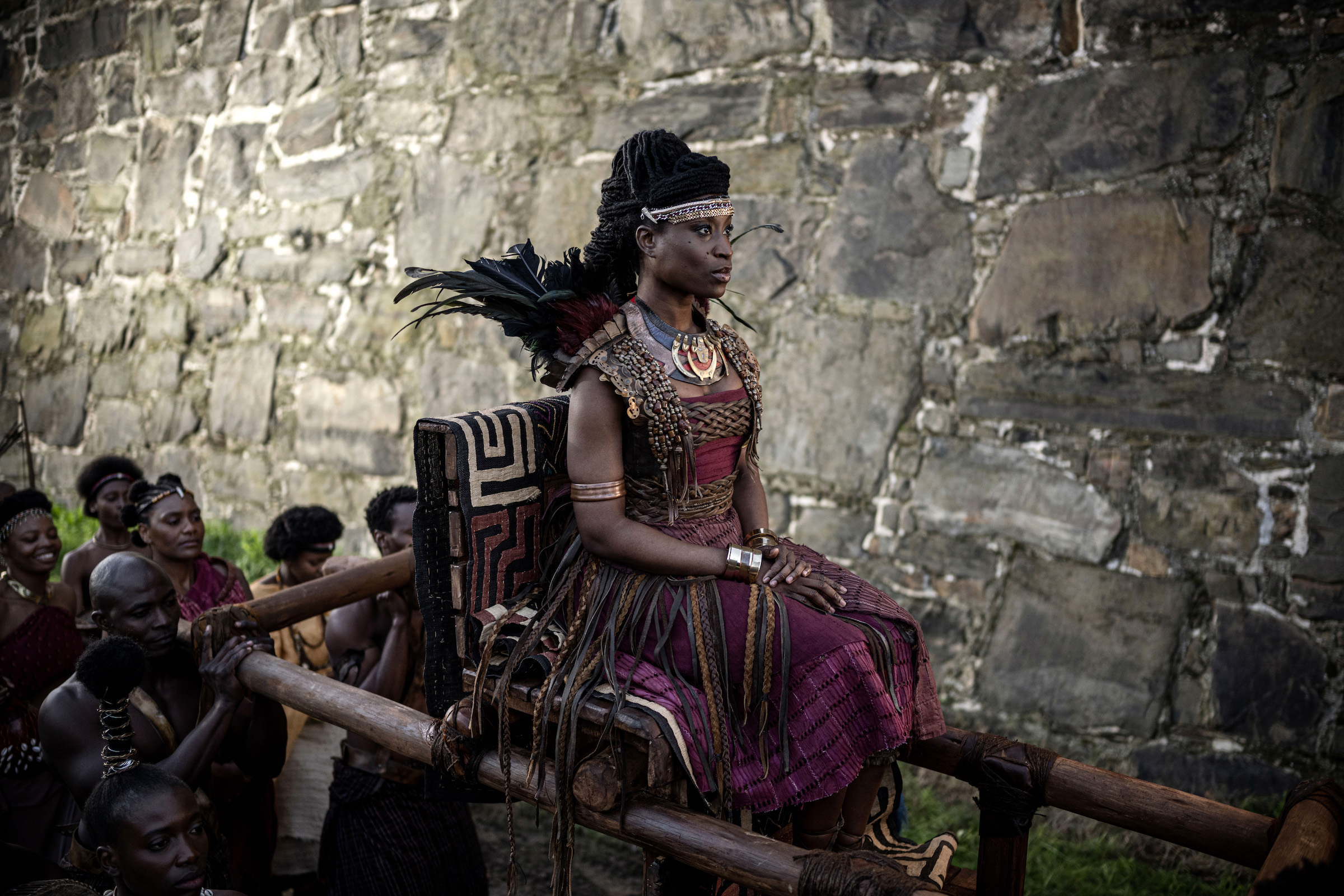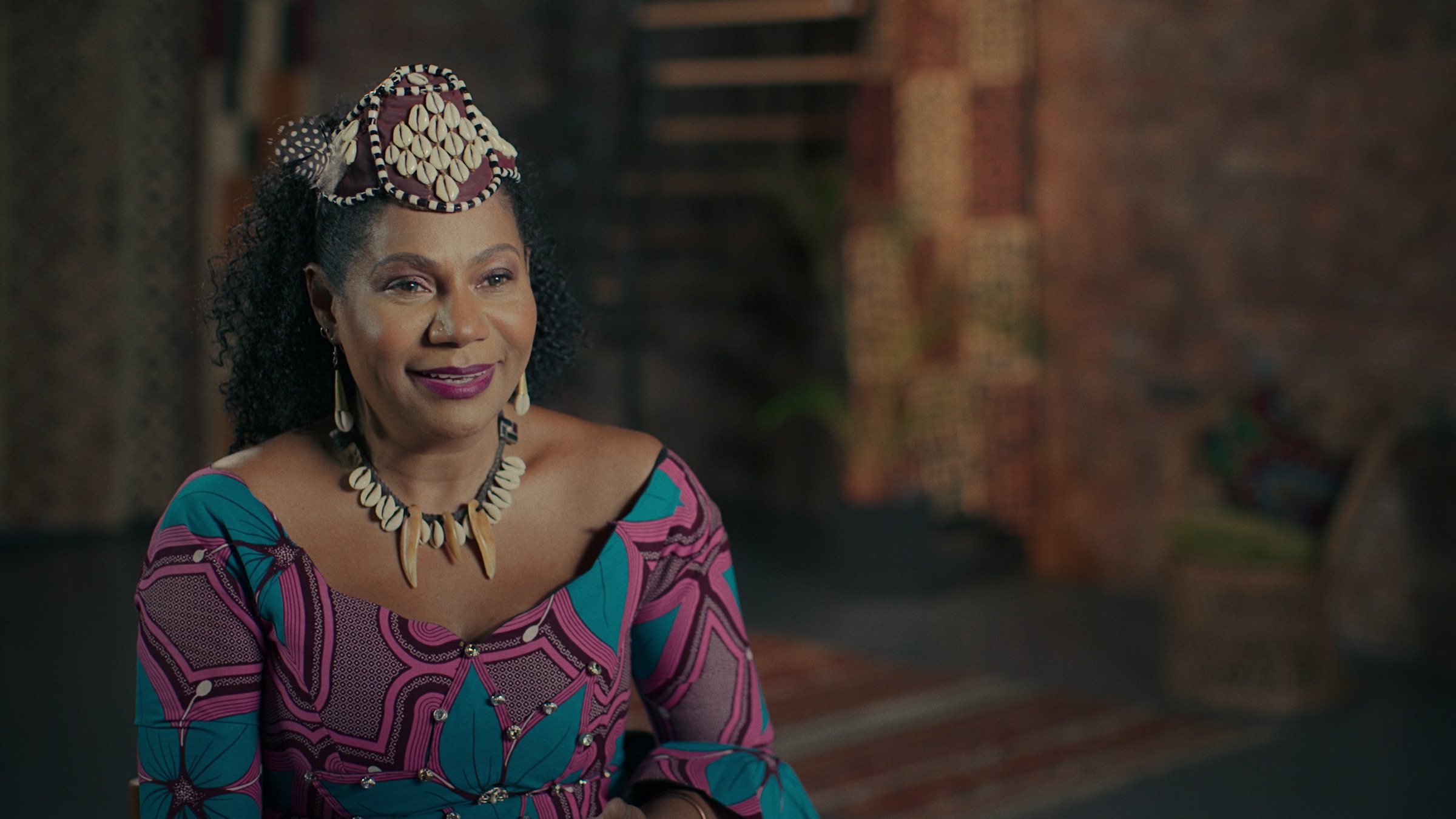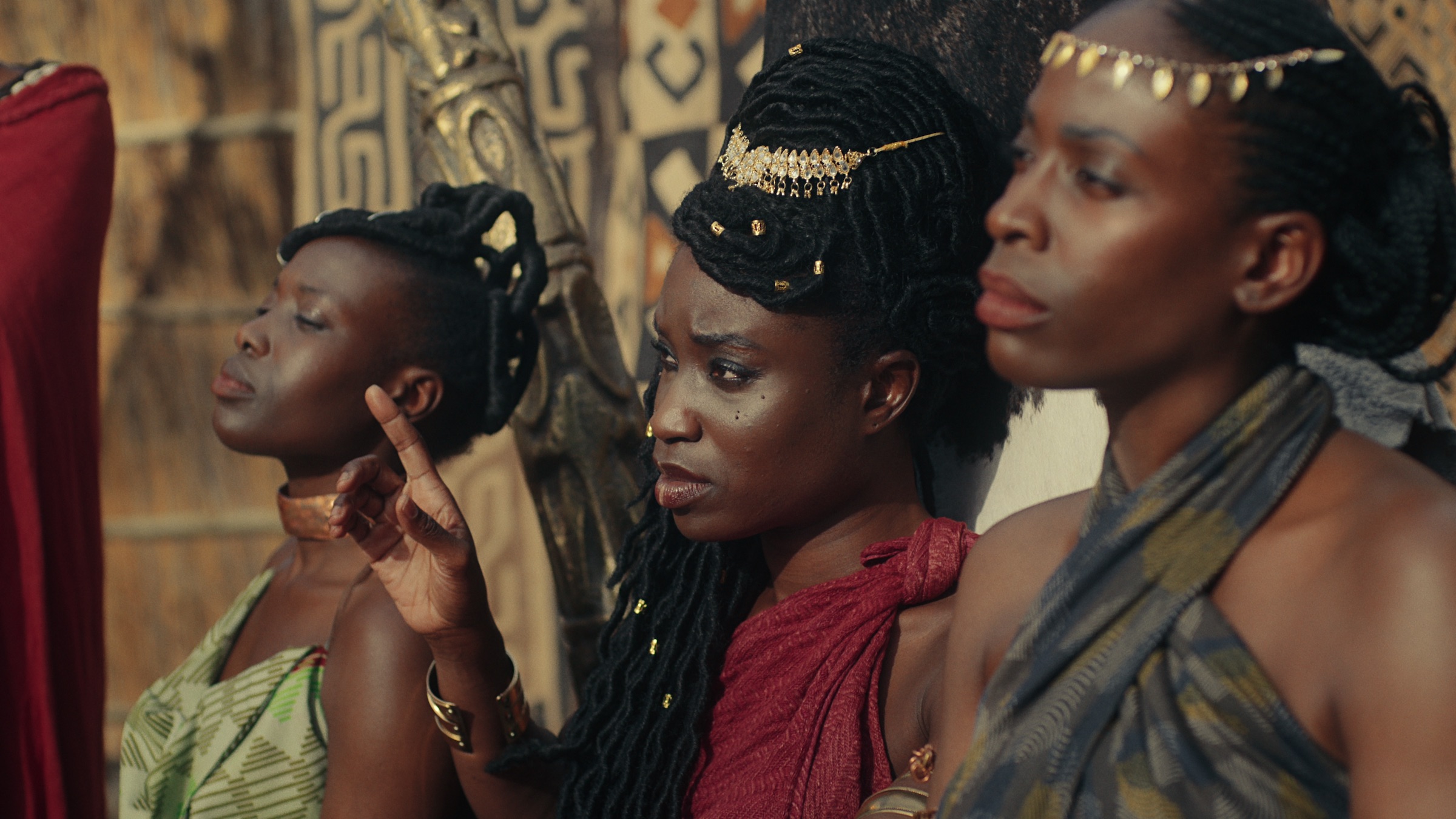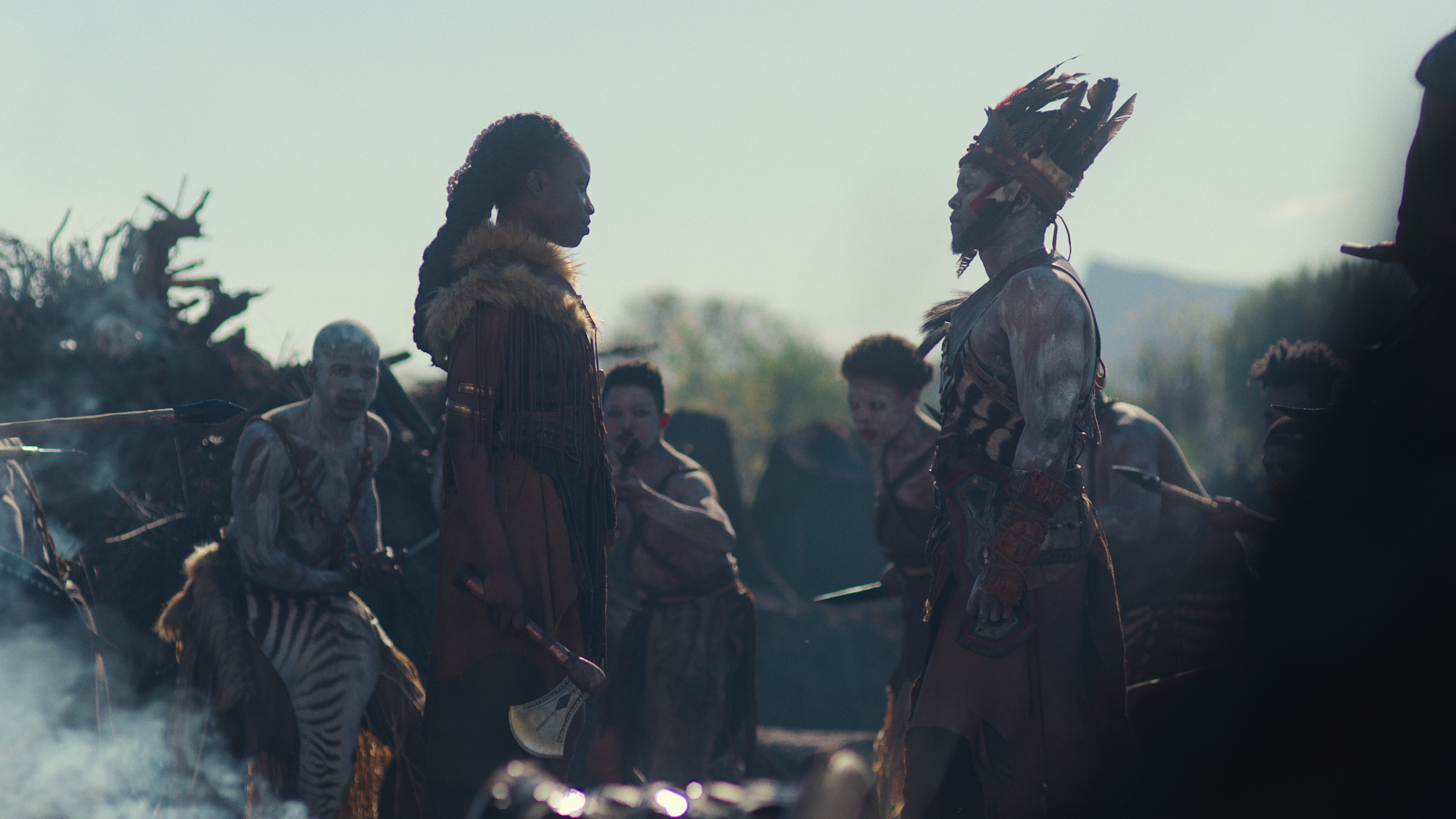
In 1624, the kingdom of Ndongo in West Central Africa (modern-day Angola) got a new queen: Njinga. Her life as the first female ruler (or woman king) of the region forms the story of African Queens, a new Netflix docudrama series executive produced and narrated by Jada Pinkett Smith.
From a military base on the Kwanza River, 42-year-old Njinga (Adesuwa Oni) rules with her sisters, Kambu (Chipo Kureya) and Funji (Marilyn Nnadebe), by her side. She has realized that—to obstruct Portuguese colonizers, who invaded the region three decades before she was born—she needs the people to challenge them. Njinga sends messengers to provinces within Ndongo, and encourages people to rebel. Enslaved people on Portuguese plantations escape. Soldiers enslaved by the Portuguese abscond. Njinga blocks roads, disrupting Portuguese slave markets.
“She’s creating sanctuary for people—not only hers, but people of other tribes,” says Queen Diambi Kabatusuila, the current woman king of the Bakwa Luntu people, in African Queens. (Kabatusuila is one of the African historians interviewed in the series, as is Rosa Cruz e Silva, the former director of the National Archives of Angola.)

Over the course of four episodes that blend documentary with narrative storytelling, African Queens: Njinga details Njinga’s life on the constant move, both literally and figuratively. The first half of the season shows a transition of power: from her father to her brother, Mbande, and then from Mbande to Njinga. The second half illustrates her rule over Ndongo and later Matamba, an adjacent territory—and her tireless fight against the Portuguese.
As the woman king, Njinga had to make made plenty of difficult decisions: persevering after her brother murdered her son to rid himself of threats, later having her late brother’s son murdered to establish legitimacy, choosing to get baptized to be taken seriously by the Portuguese, and requesting that the Pope recognize her as a sovereign ruler. Deeply flawed, human, and complex, Njinga’s political and military skill rivaled that of Catherine the Great and Elizabeth I.
“These stories, about women who were queens, should be as accessible as a story about Queen Elizabeth, all those many different Queen Elizabeth stories that we have access to,” Pinkett Smith tells TIME. “They’re so many extraordinary stories of this nature that we haven’t had access to. We weren’t taught about it in school.”
Pinkett Smith may not have learned about Njinga growing up, but she made sure her children would. The idea for African Queens, which will explore the life of Cleopatra in its second season, stemmed from conversations with her daughter, Willow Smith, she says.
“Willow and I were talking about: What are those characteristics and qualities that make a queen?” Pinkett Smith says. “Trying to raise a young Black woman, it’s a term that’s kind of tossed around a lot within pop culture. ‘Queen,’ ‘queen.’ It’s like, well, let’s really look at this. What does it take to be a queen?”
For Njinga, being queen meant toeing the careful line of diplomacy in the face of danger. Following her challenge, the new Portuguese colonial governor, Fernão de Sousa, is irate over his loss of profits and sends an envoy to confront her. Flanked by her sisters, Njinga opens the conversation with suave diplomacy and a honeyed voice. A switch flips, though, when the envoy demands that Njinga immediately return the governor’s “property.”

“Please tell the governor I would be happy to return his ‘property,’ his slaves,” Njinga says with a quiet fire. “Only problem is I don’t have any. I don’t have any slaves. I never had any slaves. Look around. Do you see any slaves here?”
“If you see any, tell me, and I will gladly return them to the governor,” she continues. “Go on. Do you see any slaves here? Tell the governor there are no slaves here, in my kingdom.”
For Adesuwa Oni, the scene fully captures Njinga’s character. “This is it,” she thought while reading an excerpt of the script to audition. “This is who she is.”
“The progression of that scene from guile and flattery to danger and pure power, it’s beautiful,” Oni tells TIME. “You see the essence of her warrior self, her politician, her mask, her intelligence, her danger.”
To be clear: the kingdom of Ndongo also enslaved many of the people that they conquered—a fact the series doesn’t shy away from. It does, however, highlight the stark contrast between the abject cruelty of European chattel slavery and slavery in Ndongo, in which individual slaves were often treated as part of the family.
African Queens: Njinga tells the story of its namesake, who gradually earned a reputation for her fusion of skilled diplomacy with military prowess. But Njinga’s rise to power, and her reign, are inextricable from European colonization and the transatlantic slave trade—two forces she battled ceaselessly.

“Sometimes I don’t think people have an appreciation of what the ‘trade’ was in slave trade,” Nnenne Iwuji, a diplomat who wrote the show with Peres Owino, said in the press notes. “I think of the toll it took, the PTSD we talk about today.”
“This story of Njinga is the pivotal point in history where the African American, the African—every Black people’s story—is seated in that one space,” Owino said in the press notes. “That’s where our story begins: the separation. It’s right there where the people on the continent, the people are being taken, and they’re spreading.”
Oni, who is of Nigerian descent (her first name, Adesuwa, means “born in the midst of wealth” in the Nigerian native languages), said balancing the historical accuracy and narrative storyline of the docudrama came naturally.
“For actors, history is technically no different to any script,” Oni says. “Because all you’re seeking is the truth, a human understanding of what is going on. Why did they make the choices they made?”
More Must-Reads from TIME
- Cybersecurity Experts Are Sounding the Alarm on DOGE
- Meet the 2025 Women of the Year
- The Harsh Truth About Disability Inclusion
- Why Do More Young Adults Have Cancer?
- Colman Domingo Leads With Radical Love
- How to Get Better at Doing Things Alone
- Michelle Zauner Stares Down the Darkness
Contact us at letters@time.com



